Introduction
Unmanned Aerial Vehicles (UAVs) have become an integral part of modern society, serving various purposes ranging from recreational use to waste management and search and rescue (SAR). The adoption of drones has been remarkable, with a substantial increase in sales of 63% between 2014 and 2015, a trend that has persisted over time. Even in Malaysia, it is reported that it has almost double its drone readiness within one year! However, despite their widespread adoption, drones, like any technological device, are not without their flaws. As a responsible drone owner, it is essential to be aware of potential issues that may arise.
The commercial use of drones offers both enjoyment and profitability, as they streamline tasks, reduce labor costs, and enhance overall efficiency and productivity. The advantages of drone technology are extensive, with each new iteration presenting significant improvements over its predecessors. Regrettably, when drones encounter problems, the consequences can be significant, both in terms of potential damages and drone repair costs. Here, we explore the six most common issues that may necessitate drone repair and maintenance.
Hardware
Drones are complicated pieces of machinery, and often we see accidents related to hardware
malfunctions.
- Damaged chassis
- Damaged propeller
- ESC board malfunction
- Undetectable GPS
- Water damage
- Faulty wiring/components
Damaged chassis
The chassis serves as the foundation on which all other drone components are mounted, offering protection to the internal electronics. While most frames have similar shapes and construction, the choice of drone frame can significantly impact its flight performance. Factors such as weight, aerodynamics, resonance frequency, and rigidity all play a role in determining how well the drone can maneuver in the air. When a drone is accidentally dropped, one of the most noticeable damages is often inflicted on its frame, resulting in scratches or dents on the body. Since the frame plays a crucial role in maintaining the drone’s stability and aerodynamics for smooth flight, even a seemingly harmless fall can disrupt the drone’s center of gravity, necessitating a visit to a drone repair center.
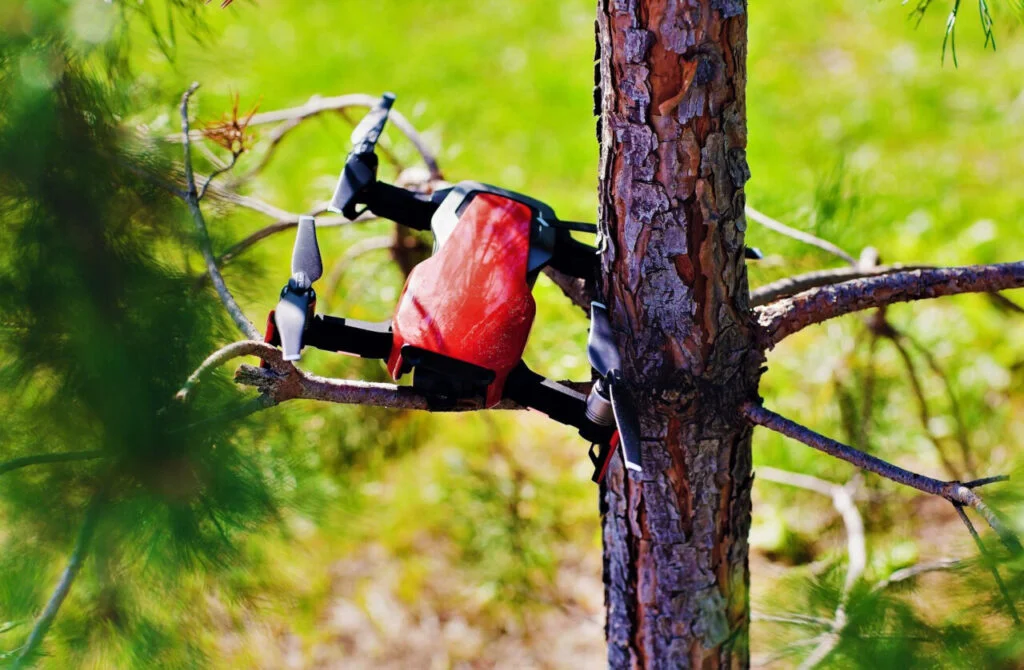
Damaged propeller
Apart from drone hobbyists, other drone users, such as farmers using agricultural drones and architects with mapping drones, have consistently encountered the issue of damaged propellers. This problem arises from unpredictable natural forces like strong gusts of wind and curious animals, particularly birds, drawn to the flying object. These unforeseen occurrences can cause the propellers to become bent or cracked unexpectedly, rendering them effectively broken. As a consequence, the drone’s performance may suffer, and in severe instances, it could lead to a subsequent crash. Thus it is crucial for drone owners to take preventive measures, conduct regular inspections, and promptly address any propeller damage to ensure safe and enjoyable drone flights.
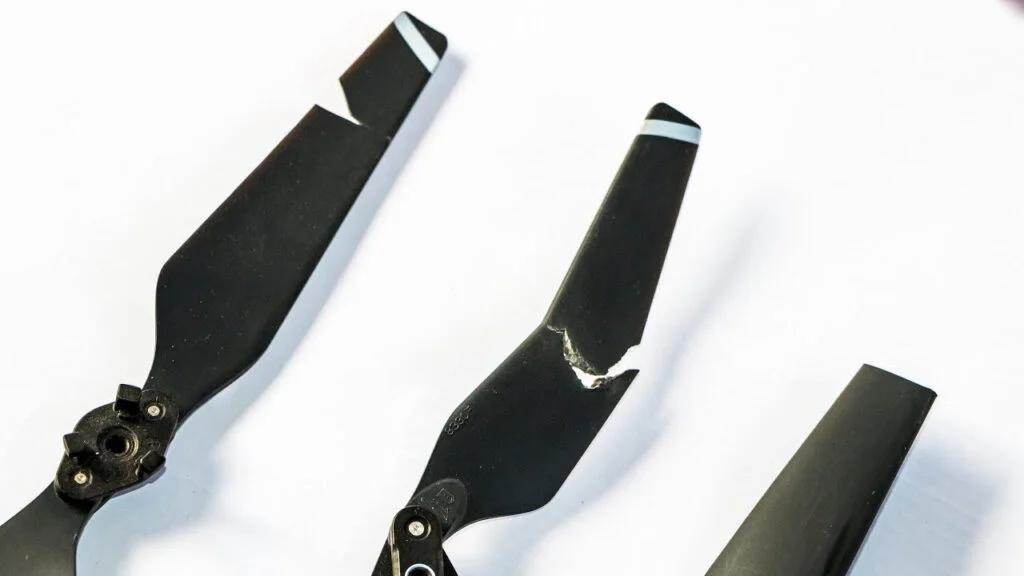
ESC board malfunction
The ESC board, also known as the Electronic Speed Controller, is responsible for regulating the motor speed of a drone. In cases where a drone crashes or is used extensively, an ESC Error may occur, indicating that one of the motors is disconnected or the software is not functioning correctly. This issue renders the drone inoperable until it undergoes an inspection and has its spare parts replaced at a drone repair shop. While some drone pilots may attempt to change the ESC board themselves, it is not advisable, as a lack of experience in this area may lead to additional problems arising.
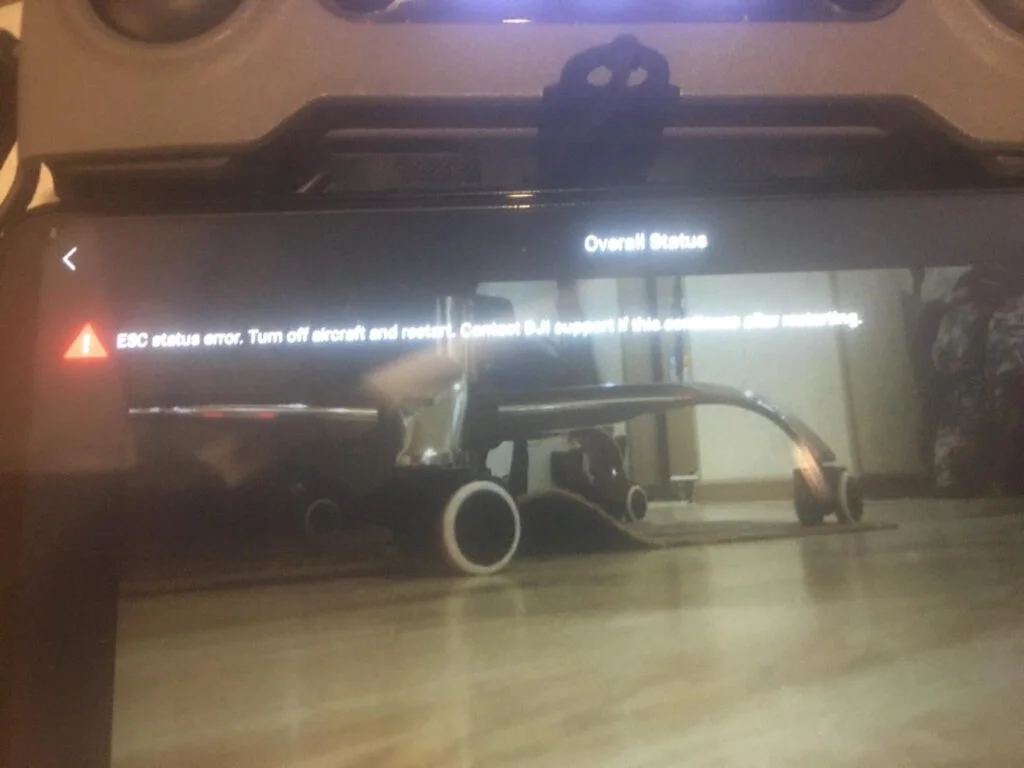
Undetectable GPS
Another frequent hardware issue we encounter relates to GPS signals. In certain regions with high magnetic interference, these signals can adversely affect the drone’s built-in GPS system, leading to a diminished ability to return to the base in case the operator loses visual contact or when the battery level is low. Magnetic interference can arise from various sources, such as high-voltage power lines or underground cables. Additionally, geographical factors, such as rocks or walls, can also disrupt GPS signals, creating what is commonly referred to as GPS-denied environments.
The accuracy and steadiness of the drone’s flight improve when it receives a greater number of GPS satellite signals. However, some vast locations may experience periods of GPS deprivation. This occurs due to underground cables interfering with the satellite signals or when the drone operates near rocks or walls that obstruct signal reception. In such instances, the pilot should relocate the drone to a new position ensuring it receives signals from at least 100° of GPS satellites, allowing the drone to function optimally. The more GPS satellites the drone receives signals from, the more stable its flight will be.

Water damage
While water damage to drones is often considered irreparable, there are instances where quick action can extend the equipment’s life. When a drone comes into contact with water or is exposed to heavy rain, its electronic speed controllers (ESCs) are at risk of getting burnt. ESCs are responsible for managing the power of the drone’s motors, and once they become damaged, it can lead to battery issues. If you do not own a waterproof drone, it is essential to take every precaution to prevent it from touching the water.
Saltwater, in particular, poses a more corrosive threat, and the damage it causes may persist even after you think the drone has returned to normal. Unfortunately, this knowledge may not be of much help if your drone has already crashed into the sea. However, in some cases, a saltwater crash can still be repaired, although it can be more challenging.
The initial step to take if your drone falls into the sea is to remove it promptly and carefully wash it with deionized water. The aim is to counteract the corrosive effects of salt, and cleaning the drone’s components with deionized or distilled water can achieve this, as unconventional as it may sound. Subsequently, you must meticulously rub your drone’s parts with isopropyl alcohol. All in all, it’s better to bring your drone to your nearest drone repair center.
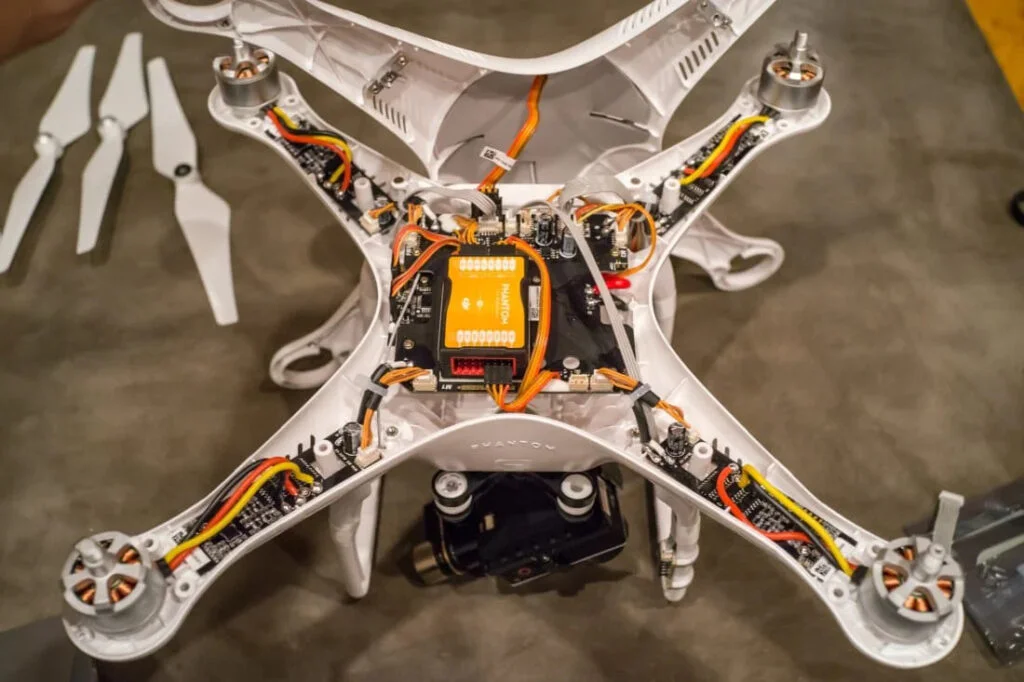
Faulty batteries
Many drones encounter issues with their batteries. Despite the initial claim in the manual of a 20 to 30-minute flight time when purchasing a new drone, the actual flight duration often falls significantly short. For instance, while intending to record a complete twenty-minute video, the battery may fail before reaching that mark.
The majority of drone batteries utilize lithium-ion technology, with the manufacturer specifying the battery’s capacity and lifespan. Unfortunately, these parameters cannot be easily improved, and over time, the battery’s performance will inevitably degrade. Factors such as overcharging or over-discharging can lead to a reduction in the battery’s capacity.
To ensure optimal battery care, it is crucial to charge the batteries using the official charger provided by the manufacturer and refrain from continuing to charge once the battery reaches full capacity. Additionally, it is recommended to turn off the drone and recharge the battery with the manufacturer-provided charger when the battery’s power reaches approximately 80%. Understanding battery care is essential when dealing with drone batteries. While there may be aftermarket chargers available, their performances may vary, and simply assuming they are as effective as the official charger solely based on appearances may lead to subpar results.
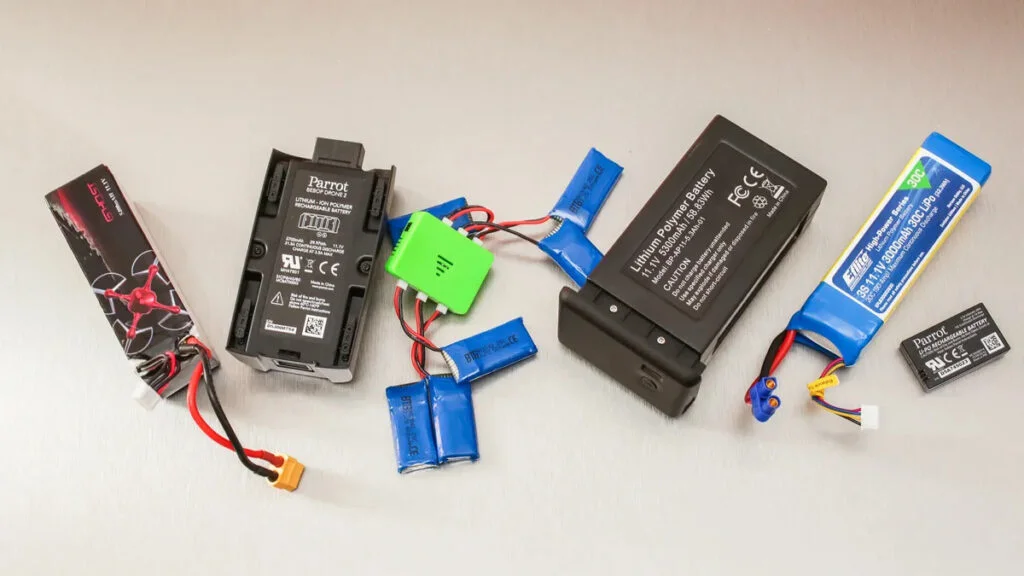
Drone Repair Solutions
Find a repair shop
Even if the damage looks minor, pay for an authorized shop. The crash may have knocked circuit boards loose, affecting much more than you see. Call the manufacturer or check its website to see if there’s an authorized repair center anywhere near you. There are about a dozen scattered throughout the country. The biggest benefit here will be turnaround time, which, compared to the huge queue you’ll face when sending a drone back to the manufacturer, will take around two weeks instead of six or more. You’re also more likely to deal with an invested human being. However, these problems can easily be solved if you choose the correct drone repair shop in your country. Some great drone repair shop available in Malaysia is Aonic outlets. Aonic provides great services and offers a wide range of products ranging from water drones, commercial drones, and agricultural drones.
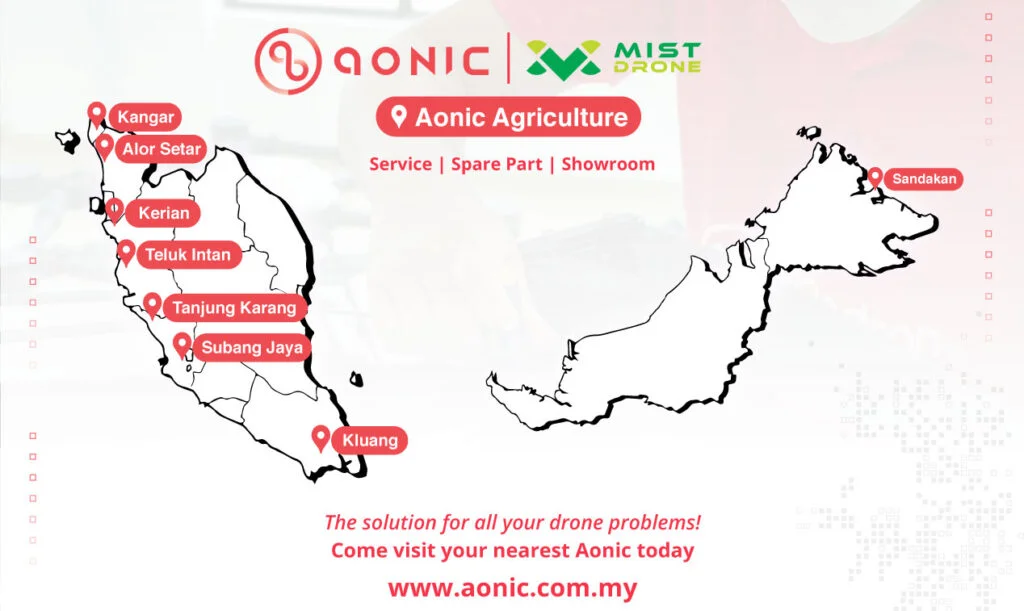
Send it to the Manufacturer
Returning drones to the manufacturer can be a horrible experience—multi-month waits, indifferent customer service, warranty disputes—but if you don’t have an authorized repair shop nearby, there’s no better option. The huge facilities have factory parts and calibration software that ensure proper repair. If you are among the 5 percent of pilots who crash due to build defects, not pilot error, and you’re within the warranty, repairs are free. Just don’t expect to convince anyone that the crash wasn’t your fault if it really was. Drones have internal black boxes that record exactly what happened before a collision.
However, Aonic has currently launched a program called Aonic Care for our customers who purchased their DJI Enterprise drones with us. It comes with 3 packages: Aonic Care Basic, Aonic Care+ (Drone), and Aonic Care+ (Payload). Each of these packages have different coverage depending on the model of your DJI drones.
DIY
If you accidentally damaged a propeller by hitting it on a branch or cracked a component like a camera on a relatively simple drone model like Tecqie, which has instructional videos provided by the manufacturer online, then it is safe to go ahead and replace the damaged parts. However, beyond these minor repairs, it is advisable not to attempt further fixes.
If you are determined to attempt repairs regardless, some drone companies like Aonic offer direct sales of replacement parts. While DJI doesn’t sell as many individual parts, you can find scrap drones on eBay and salvage components from those. However, it’s important to be cautious, as a botched repair can result in more significant damage. In such cases, you might consider selling your drone for scrap on eBay to recoup some of the costs.
Conclusion
Drone repair and maintenance are vital aspects of owning and operating these sophisticated machines. By understanding common issues, following proper repair procedures, and implementing regular maintenance practices, drone owners can ensure the longevity, safety, and efficiency of their aerial devices. Additionally, it is crucial to stay updated with the latest guidelines and recommendations provided by manufacturers to maximize the drone’s capabilities and enjoy a seamless flying experience.
Reference
Tags:
ApplicationAugust 2, 2023




Comments